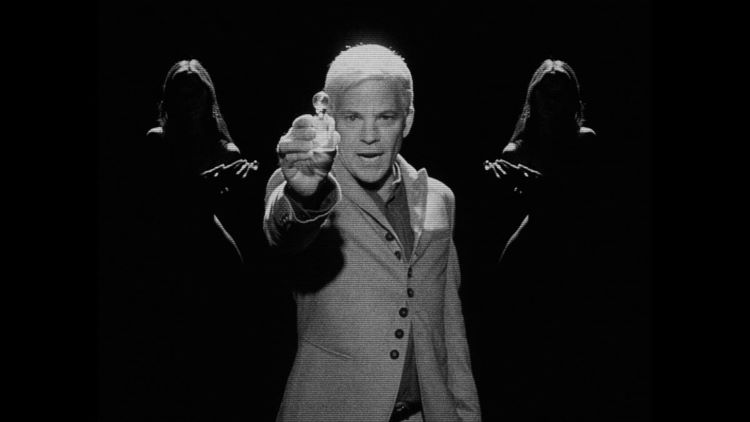
Eddie Alcazar’s Divinity is a film that begs to be seen. Heck, it’s pleading to be seen, to be noticed, and to be appreciated. Almost to the point where its timely message gets drowned out by its chaotic aesthetic. It’s an ambitious effort with some skillful craft at hand. But it lets its ambition get in the way too much to the point where it can be a tough pill to swallow.
There is a lot to admire here, don’t get me wrong. Alcazar shoots the film with a grainy, black-and-white look that aptly contributes to the film’s grimy and bleak atmosphere. It gives Divinity an experimental, late ’70s, early ’80s-era feel, and it goes for broke in attempting to be on the same level as Eraserhead or a horror film that David Cronenberg would direct during that time. But it also falls into the trap of recycling similar messaging that has been explored before. And the more it tries to be different and edgy, the less effective it becomes.
Divinity takes place in the future. Society has devolved to where the infertility rate is extremely high, and most people of the world are focused on looking gorgeous and wanting to live forever. Thanks to a new drug called Divinity, they can do just that. And they can have all the lavish parties and sex that their heart desires. From the start, there’s a great deal of commentary on the dangers of this mindset and how damaging it can be for human existence. You get the sense that Alcazar is going to explore some territory that gets glossed over in most features, and that’s an interesting approach to take.
At the core of the story is scientist Sterling Pierce (Scott Bakula), who dedicated his life to creating the successful immortality drug. His son, Jaxxon (Stephen Dorff), has now taken over the reins of distribution, and he becomes too engrossed in the demand for Divinity – to the point where he loses focus on what’s in front of him. One night, Jaxxon is kidnapped by two twin henchmen and held hostage while they attempt to rid Divinity from existence. Simultaneously, Ziva (Bella Thorne) leads an army of women who are still fertile and want to help repopulate the dying planet.
Alcazar admitted in an interview that Divinity was made without a traditional script prepared ahead of time. Instead, he opted for a series of ideas he had in mind and drew them out to form what is present in the film. And, at certain points, it does feel like he decided to throw in whatever he concocted in the hopes that it would stick. A scene in which Dorff and another character fight in stop-motion animation is one of many out-of-the-ordinary moments that appear in the film. I’ll let you be the judge on how that scene works out.
I’m sure there will come a time when Divinity is reexamined and reassessed to achieve some kind of cult status for a new generation. I don’t think that time is now, and I’m not sure when it will happen. But I can see it happening, even if I’m not someone who is fully onboard with what Alcazar is showcasing.
Divinity is ambitious and daring to a degree. Its bleak cinematography matches the pitfalls of being sucked into a world where everyone can achieve model-like beauty. But, for all its experimentalism, there isn’t much that it adds to the dystopian nightmare of narcissistic behavior killing off the planet. Its nightmarish style attempts to cover its tired messaging, but even that can’t mask what lies underneath.
Divinity begins its theatrical run October 13 in New York, October 20 in Los Angeles, and nationwide on November 3.